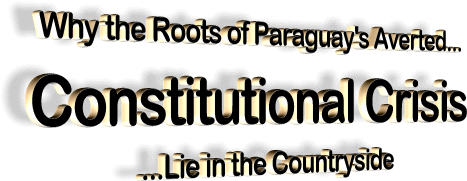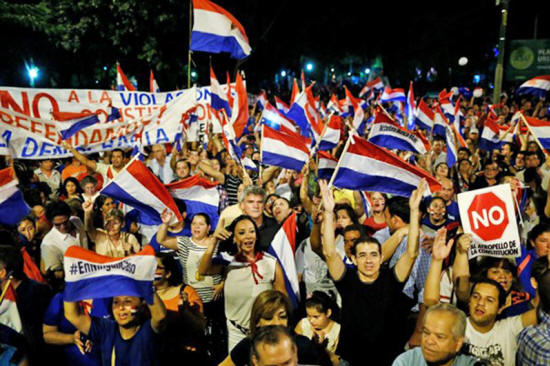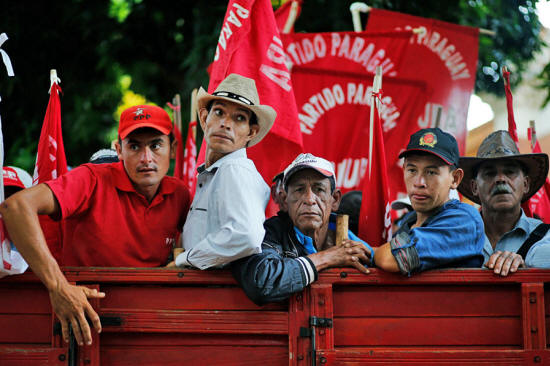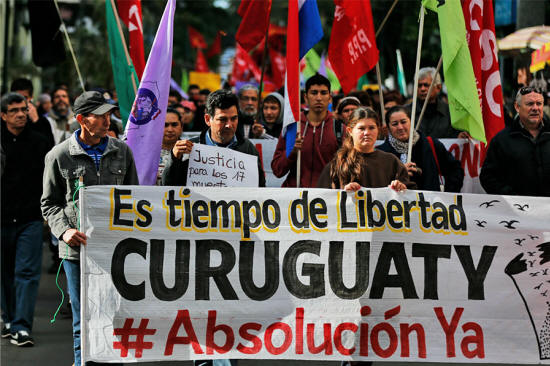|
from WorldPoliticsReview Website
Paraguayans protest against a plan to change the country's constitution Asuncion, Paraguay, March 30, 2017 (AP photo by Jorge Saenz).
The dramatic events that took place on the evening of March 31 grabbed an unusual amount of international media attention for Paraguay.
After months of
behind-the-scenes preparations, the governing right-wing Partido
Colorado (PC), the left-wing Frente Guasu coalition (FG) and a
dissident faction of the Authentic Radical Liberal Party (PLRA) made
a bid to change the constitution to allow for presidential
re-election, which is prohibited by Paraguay's post-dictatorship
1992 constitution.
But an abrupt
behind-closed-doors vote to consider the possibility of a second
term provoked the ire of a normally apathetic general public.
Listen to Laurence Blair discuss this article on WPR's Trend Lines Podcast:
Amid minor demonstrations across the small country of 6.6 million people, protesters in the capital, Asuncion, pushed back a weak police cordon to storm the steps of Congress.
A small group of
rioters among them smashed windows, looted the interior of the
building and set small fires on the ground floor.
The image of a
young demonstrator lying dead in a pool of his own blood prompted
comparisons to the "marzo Paraguayo" of 1999, when a factional
struggle in the wake of Alfredo Stroessner's Colorado dictatorship,
which ruled from 1954-1989, led to the shooting of seven protesters.
Eleven days later, following pressure from the Vatican and the United States, which is an important source of aid to Paraguay, Cartes announced that he would not seek re-election in April 2018.
That effectively
neutered the constitutional amendment, which was duly voted down by
the government-controlled lower house a few days later. With that,
the brief crisis seemed to be over.
Major press, TV and radio outlets - above all, ABC Color, owned by tycoon Aldo Zucolillo - presented the government's re-election drive as a catastrophe for Paraguay's young democracy that would set the stage for another Colorado dictatorship.
ABC Color's fervent
opposition to the amendment was attributed by many to the rivalry
between Cartes and Zucolillo, who has reason to resent the
growing share of Paraguay's media acquired by Grupo Cartes,
a conglomerate owned by the president that has been administered by
his sister since he took office in 2013.
Many protesters seemed to be less angeredby the idea of re-election in itselfthan by the government's secretive pursuit of it.
Supporting this
view of an imminent crisis was the opinion of the majority of
constitutional experts that the government's attempt to change the
rules prohibiting re-election via a constitutional amendment, rather
than a more gradual and deliberative reform that would involve
convening an elected constituent assembly,
was flagrantly unconstitutional.
Those supporting the bid to revise the constitution, including media holdings like the Grupo Cartes' La Nacion, were sympathetic to the government's argument that a constitutional amendment via a nationwide referendum would "let the people decide."
They also
repeated government claims that powerful economic interests had
whipped up public anger and paid rioters, in particular from the
poor Chacarita slum immediately adjacent to Congress, to spearhead
the demonstrations.
The anti-amendment protests were promoted and partly co-opted by the PLRA, for example.
But its claims to be standing up for the rule of law rang hollow for many; its abrupt withdrawal of support in 2012 for former President Fernando Lugo led to his controversial impeachment, and the party is widely suspected of being complicit in massive corruption under Lugo's immediate successor as interim president, Federico Franco.
Also fighting
re-election tooth and nail was a crony-capitalist Colorado faction
headed by Mario Abdo Benitez, the son of Stroessner's private
secretary.
Instead, they are calling for a more profound analysis about the failings of contemporary Paraguay's political economy.
Her sentiment is shared by many who were born after the return to democracy in 1989.
Sandino Flecha, a member of the Frente Estudiantil por la
Educación (FEE), an umbrella student organization, says that
Paraguayans need to "deepen this sterile anti-amendment debate"
beyond elite in-fighting to address the more fundamental problems
facing the country.
An approach that
would be simplistic or incomplete in other Latin American contexts
still has important explanatory power in Paraguay, where economic
and political power is still largely based on the ownership of large
"latifundio" estates.
This follows a pattern laid down in the late 19th century, when, after a ruinous war with Brazil, Argentina and Uruguay, Paraguay was forced to throw open its borders to foreign investment as a means of recovery and debt-repayment.
Today, the country is the world's fourth-biggest exporter of soybeans and the seventh-largest producer of beef, with both sectors expanding massively in the past decade in response to global demand:
Agricultural workers arrive to participate in an annual march organized by the National Farmers' Federation, Asuncion, Paraguay, March 17, 2016 (AP photo by Jorge Saenz).
Not all Paraguayans benefit from this, however.
Newly-released government data suggest that just under 30 percent of Paraguayans live in poverty, rising to nearly 40 percent in the country, and land ownership in Paraguay is by some measures the most unequal in the world.
United Nations figures put the Gini ratio - a commonly used indicator of inequality where zero is perfect equality and 1 is perfect inequality - with regard to land ownership at 0.94.
Research compiled in a 2016 report by Oxfam indicates that ownership of agricultural land is fundamentally skewed toward a small group of families and their businesses.
Some 90 percent of the land in Paraguay belongs to 12,000 large agricultural estates, which make up less than 5 percent of the total number of farms.
The remaining 10 percent of land is shared among 280,000 small- and medium-sized properties. Around 600 estates bigger than 10,000 hectares collectively make up 40 percent of the country's agricultural land.
Meanwhile, 180,000
farms are smaller than 10 hectares - the basic unit recognized by
Paraguay's agricultural code needed to support a family.
According to Oxfam,
the Zucolillo, Cartes and Vierci families - owners of rival media
and business groups - figure among the 15 biggest landowners in
Paraguay, with major Brazilian and Argentinean firms occupying other
top spots.
On both sides of the Rio Paraguay, but particularly in the Chaco, this process has often displaced indigenous groups and destroyed their traditional ways of life.
In Campo Loro and Tunocojai - dusty settlements of indigenous Ayoreo people an hour from the Mennonite colony of Filadelfia - village leaders complain that large cattle estates are encroaching on the few shreds of forest and natural habitats left standing nearby.
In Asuncion, I met with leaders of the Ayoreo Totobiegosode at the offices of GAT, an NGO that is supporting the group in government negotiations to protect ancestral territory currently partially occupied by private landholders.
The tribe's leaders worry that the remaining small groups of Ayoreo will be unable to remain in voluntary isolation for much longer.
In the eastern half of the country, the expansion of large agricultural estates more often involves the expulsion of campesinos, or small-scale landowners, from disputed lands, although indigenous communities here are also under pressure.
Under the Stroessner regime and its successors, agrarian reform was piecemeal and fundamentally flawed.
Stroessner did sponsor campesino colonies, but these were often merely used to clear forested areas, later being displaced by large estates owned by allies of the regime.
According to
Paraguay's 2008 Truth and Justice Commission, of the 12.3 million
hectares of land redistributed by the state between 1954 and 2003,
7.85 million hectares, much of it already settled, were
illegally handed to business and military figures loyal to the
government - a total area greater than the size of Panama.
The legal purchase or illegal appropriation of campesino and indigenous lands means that, according to government figures, there are around 75,000 campesinos across the country without any land; Oxfam and local NGOs suggest the real figure is four times higher.
Nor do the larger estates tend to employ significant numbers of people:
These families, faced with the disappearance of their means of subsistence, have two choices.
One is to continue to occupy the lands in question, risking forcible removal by police or private security forces.
The other is to migrate to Paraguay's cities, principally the greater Asuncion area, as thousands have done in recent decades:
Many end up in informal neighborhoods like Banado Sur, on Asuncion's south side, where the main source of employment is sifting through the huge municipal trash heap that towers over the low-lying settlement.
Another common
destination, La Chacarita, on the north side of Asuncion, runs from
the bank of the Rio Paraguay right to the doorstep of Congress, and
is as flood-prone as Banado Sur.
Jorge Silva, a community organizer, tells me he believes media reports that anti-Cartes groups paid young men from the Chacarita to fuel the March 31 protests, but doesn't blame them for taking the money and sending a crude message to Paraguay's political elites.
The most notorious campesino eviction in recent years came on July 15, 2012, at Curuguaty, in the eastern department of Canindeyu, which led to the deaths of 11 campesinos and six police officers.
The small parcel of land claimed by the campesinos, known as Marina Cue, was only a fraction of a huge swath of contested territory granted during the dictatorship to Blas Riquelme, a close associate of Stroessner and one-time president of the Colorado Party.
But the heavy police response - and the harsh prison sentences handed out to 11 campesinos in a subsequent investigation that, according to local and international observers, was plagued with severe irregularities - seemed designed to discourage future occupations.
Supporters of the relatives of 11 farmers killed in a shootout with police in the town of Curuguaty march to demand justice. Asuncion, Paraguay, July 6, 2016 (AP photo by Jorge Saenz).
Sources in the
Paraguayan judiciary have maintained that the case was conducted
appropriately, and that the campesinos in question had
been accused multiple times of cattle theft and other crimes.
Paraguay's Court of Appeal confirmed the sentences in June this year, meaning that, pending review by the Court of Cassation, campaigning groups are now set to take the case to the Inter-American Court of Human Rights, which has already begun investigating the killings.
Amnesty International has meanwhile condemned the Paraguayan state's failure to investigate the killing of the campesinos. The U.N. Human Rights Commissioner described the alleged shortcomings in the trial as "deeply troubling."
An exhaustive report by Codehupy, the human-rights organization, includes testimony accusing police of executing and torturing wounded campesinos or leaving them to die, and documents how important pieces of evidence went missing during the trial.
Her husband, Arnaldo Quintana, was among those sentenced to 18 years in prison.
Kanonnikoff, the human rights campaigner, is supporting the relatives of prisoners, and fears that, if the case is not overturned, it will establish a legal precedent that will encourage violent evictions in other land disputes.
The Curuguaty case reveals some of the drivers of the re-election crisis.
Competition for land that can be turned over to agribusiness is increasingly fierce:
This in turn has increased the stakes for gaining or retaining control of the government, which offers greater influence over the judiciary and other state bodies, and thus greater freedom to amass wealth in the countryside.
The fierce response of the state security services at Curuguaty and during similar land disputes elsewhere - as well as the deployment of a military task force in several northern provinces since 2013, ostensibly responding to the threat posed by a tiny guerrilla group, the Ejercito del Pueblo Paraguay - also prefigured the unprecedented attack on the PLRA headquarters on March 31.
According to
Codehuypy,
at least 115 campesinos linked to land struggles were murdered
between 1989 and 2013, with convictions resulting in just 8 cases.
The "express impeachment" that followed - Lugo was given just 24 hours to prepare his defense - was decried as a parliamentary coup by domestic critics and left-wing regional governments.
It also dealt a significant degree of damage to perceptions of constitutionality, arguably paving the way for this year's unconstitutional re-election bid.
Congress may only have been set on fire in March,but the flames have been flickeringin the countryside for a while.
In supporting this attempt, the FG hoped to allow Lugo to run for the presidency in 2018; the party still maintains that, via other legal loopholes, he can do so.
But while his time in office, albeit cut short, is generally seen as having benefited Paraguay's poorest, it failed to seriously address inequalities in rural landholding.
The backroom deal the FG made with the PC on re-election has further damaged his popularity.
An
ongoing legislative alliance between FG and the PC has further
disappointed some of the FG's base.
But changing such a fundamental part of the constitution without due process would have arguably set a dangerous precedent.
Moreover, the fact that Cartes' bid failed means that future attempts to allow re-election will probably have to involve a gradual constitutional reform, which will require greater public participation and earn greater legitimacy.
That could provide
an opportunity to look at other problematic aspects of Paraguay's
political system, such as the closed party lists for congressional
elections that shield corrupt party grandees from accountability at
the ballot box.
Pena, a newcomer to the PC and still formally affiliated with the PLRA, lacks traction with the conservative, rural chapters of the PC despite Cartes' backing.
As a result, he is unlikely when in office to risk challenging the privileged position currently enjoyed by agribusiness or expediting claims over disputed land in favor of the campesinos.
Rather than major efforts to tackle rural and urban poverty - such as a wholesale agrarian reform, or an increase in the currently minimal tax burden to fund greater social programs - incremental changes are more likely.
But supporting
rural communities makes both economic and political sense in the
long term.
And making
legitimate economic activities viable for campesinos would reduce
the incentives for involvement with armed groups and organized
crime. It would also stem the flow of the destitute to Asuncion,
thus reducing both pressure on the congested metropolis and the
supply of angry young recruits likely to participate in future civil
unrest.
Paraguay's future
presidents should look there if they want to avoid greater
conflagrations in the future.
|




